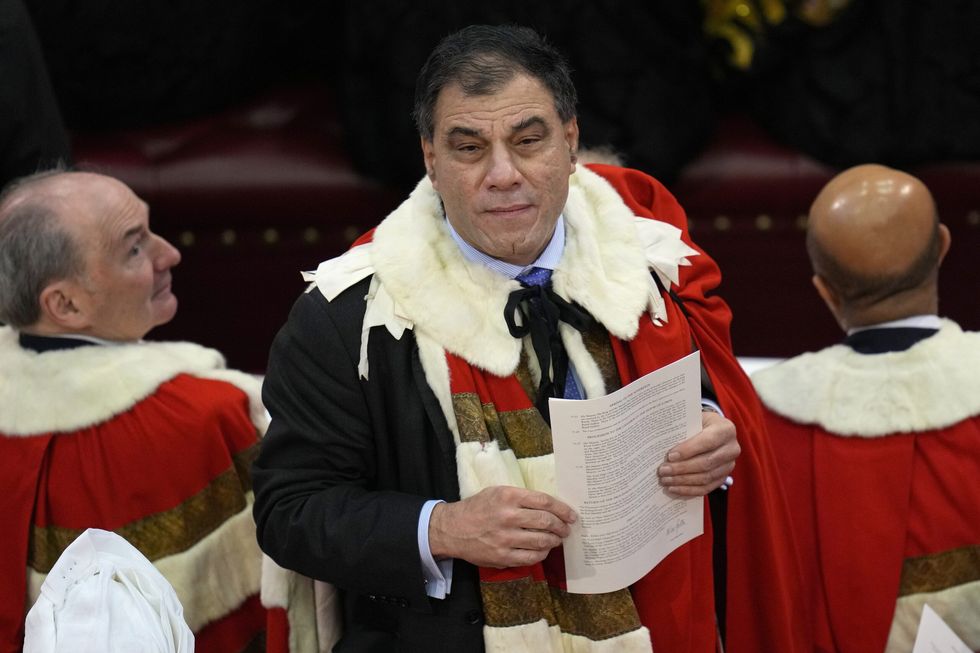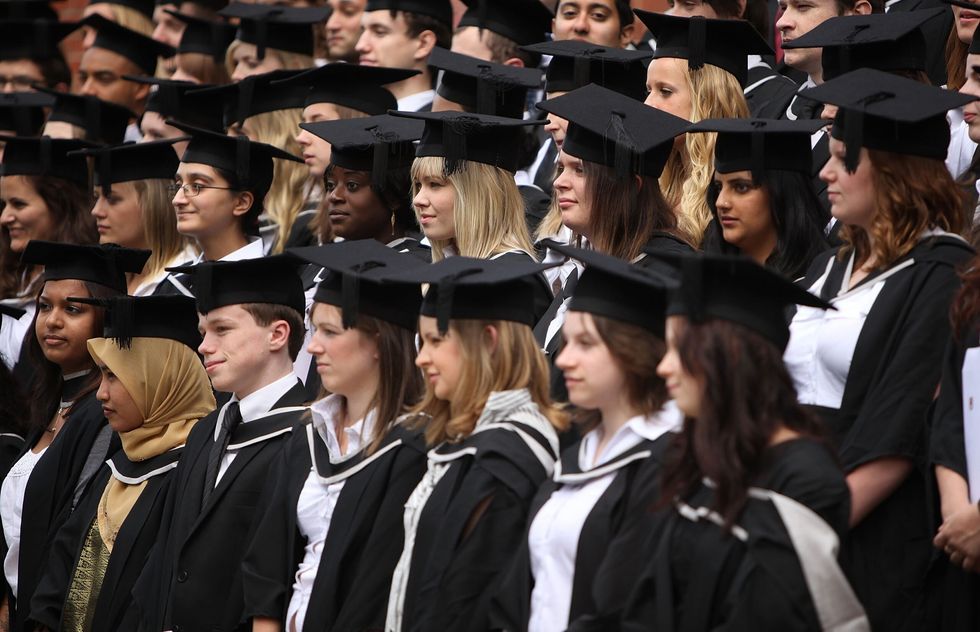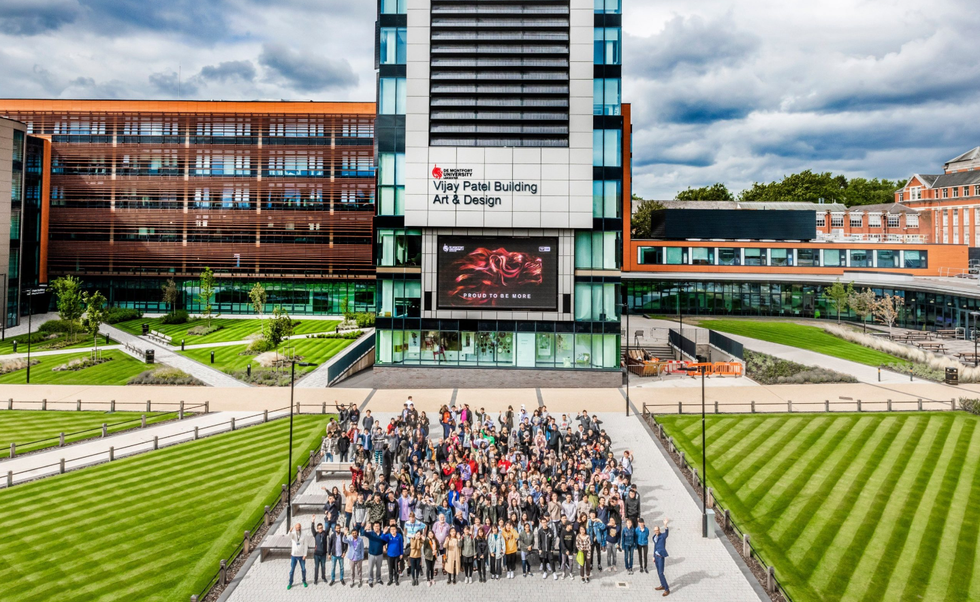THE government’s decision to impose visa restrictions on international students to cut immigration figures is “anti-universities” and “economic illiteracy”, according to a peer and university chancellor.
From January, the Home Office stopped postgraduate students from bringing their families with them when studying in the UK.
When he announced the restriction, the prime minister, Rishi Sunak, told his cabinet that it would make a "significant difference” to migration figures, which his critics say is out of control.
But the crossbench peer and chancellor of Birmingham University, Lord Karan Bilimoria, told Eastern Eye that the move would negatively affect the UK’s economy.
“This is very, very worrying, and this is because of the negative immigration signals that are being put out by this government, which is, quite frankly, anti-immigration, anti-international students and anti-universities,” he said.
“This is folly, this is shooting ourselves in the foot, and I just don't understand, it's economic illiteracy.
“It's in every way, and with universities being such an important part of our economy that is so crucial to our productivity.”

Student numbers
India topped the table making up almost 30 per cent of those sponsored to study here.
About 18 per cent are from the European Union.
Of these, it issued just over 134,000 to family members – up just four per cent from March 2022.
Two-fifths (39 per cent) are from India, Pakistan and Nigeria.
Almost 387,000 allowed students to work, an increase of 75 per cent on the previous financial year.
Both under and postgraduates are allowed to stay and work for two years on top of their education permit.
Economic benefits
Issuing these visas, said the president and founder of Cobra Beers, helps the UK economy grow.
“International students contribute £42billion to the UK economy,” said Bilimoria. “It's absolutely huge, that's the sort of size to run the defence budget.
“It's not just the money, more importantly it’s the tremendous soft power international students have.
“They are huge ambassadors for the United Kingdom, and it's a generation long relationship.
“In my case, I'm the third generation to be educated in the UK, going back almost 100 years.
“Also 25 per cent of world leaders, as we speak, have been educated in British universities, another 25, at US universities, and all the other countries in the world is 50 per cent.
“So, that's how powerful it is, and they enrich the experience of our domestic students.”

Home students disadvantaged?
In January, The Times suggested that they were taking the places of UK students applying for so called Russell Group universities.
The paper accused these elite higher education institutions of “paying middlemen to recruit lucrative overseas students on far lower grades than those required of UK applicants”.
The Russell Group, which says that its members have more than 60,000 undergraduate students, said it had taken steps to tackle this problem.
"The behaviour of the agents highlighted in media reports clearly falls short of the high standards our universities expect and require, and consequently a number of agent contracts have been reviewed and terminated,” a spokesperson said.
“International students and their families have the right to expect professionalism and honesty when working with agents so they can take decisions about their education that are right for them, with information that is accurate and consistent with university admissions policies.”
Then last month, the paper wrote that the top universities “get most of their fees from foreign students as they become increasingly reliant on overseas cash to stay afloat”.
Eastern Eye approached the Russell Group for comment, but it failed to respond.
But on its website, it did not appear to dispute the findings.
"International students are an important part of our university communities, enriching the learning environment for all,” it said in a statement.
“The fee income from international students is reinvested into high-quality teaching and research to benefit all students – covering the shortfall in the government funding system for UK students.
“However, with shortfalls growing, this leaves the sector vulnerable to shocks.
“Indeed, early data suggests that changes to UK government policies, including the ban on postgraduate taught students bringing dependants, are already having an impact on international student numbers.
“These changes need time to bed in and any further restrictions on student immigration, such as to the graduate route, could significantly destabilise the sector, and result in less spending in local communities, fewer opportunities for domestic students and less UK research.”
Immigration myths
It is left to parliament to dispute the idea that home students were being disadvantaged after similar claims by the Financial Times in July 2023.
“The UK government has said it is a ‘myth’ that universities prioritise international students for places over UK students, with places offered to UK students and those from overseas in ‘two separate streams’,” said a report.
“An August 2022 blogpost by the Department for Education said, ‘Universities allocate and offer places to students in separate streams – for those who are from the UK and for those that are from overseas.
‘It is a myth that offering a place to an international student takes away a place from a student from the UK.’”
Last week’s (23 March) Ipsos-British Future Immigration Attitudes Tracker suggested that more than half (53 per cent) surveyed were in not in favour of cutting student immigration.
“The public has recognised their benefit to the economy and for the UK’s international relations,” the report’s authors said.
“They are also correctly regarded as often staying here temporarily, rather than as permanent migrants, and many people therefore think they should not be included in net migration figures.
“Understanding current public attitudes on these migration routes is important since, as with migration for work, it may be wrongly assumed that government messaging and policy changes regarding migration for study are widely supported.”
Forced course closures
Lord Karan Bilimoria is also the president of the UK Council for International Student Affairs (UKCISA).
He told Eastern Eye that without international students many courses would be forced to close.
“I'm very proud of what our universities do,” said the peer, “but just imagine we're doing this with our hands tied behind our backs through a lack of funding.
“International students fees are very, very important to universities, as well as the existence of many courses.
“One of the misnomers is that international students take away the places of our domestic students because when it comes to undergraduate students, only 15 per cent are international.
“It's the postgraduate students where they are over 44 per cent, and without those international students, we would not be able to have the postgraduate offering.
“We'd have to close many, many courses because we just wouldn't have enough people to fill them.
“Now that the domestic student fee is capped at £9250, which in real terms given inflation, would only be worth about £6000 pounds today, and universities have had inflation and costs, so the costs have been going up and your revenue has come down by a third.
“If you told me at Cobra Beer that you were going to reduce your revenues by a third, and your costs are going to go up at the other end, with inflation having hit 11 per cent recently, I'd go bust.”
Scaring the public
He echoed the Russell Group’s warning that changes to the immigration rules effecting international students will create problems for the university sector.
“This is purely political because the government continues to include international students within the net migration figures,” said the chancellor of Birmingham University.
“I've been spearheading this in parliament, saying to the government, please when you present the net migration figures, exclude international students from them and treat them as temporary migrants.
“Officially, according to the UN definition, an international student who stays for a minimum of one year, is treated as an immigrant.
“Of course, they're not immigrants, and other countries like America and Australia, exclude international students when they present the net migration figures domestically.
“Why the government don’t do this, I cannot understand because the net migration figures 670,000, 700,000, would virtually halve if you excluded international students.
“They just won't listen, and instead they go on scaring the public.
“The government just seem to take universities for granted, and it's very sad, and yet they want us to be seen as a superpower.
“They want us to be a high wage economy, well then, invest in our universities, invest in research and development.”
A student’s story
“We’re just cash cows who face racism and isolation”
Anil (not his real name) came to study in Britain from India just after the pandemic, writes Barnie Choudhury.
He always wanted to study here because, like many, he knew a post-graduate qualification from Britain would increase his chances of a good job back home.
And like many, he had to make huge sacrifices to even get entry to the UK.
“Our schooling has been done in English, but we still have to undergo an English exam,” he said.
“I joined English classes for one year, and they were pretty basic, but I had to go every day for four hours, and they charge a lot of money.
“The thing is that if you fail in that exam, you have to do the process all over again.
“It's very expensive, the tuition fees, exam fees, and you need to understand that the majority of students who come from places like India, Bangladesh or Pakistan, they're lower middleclass people who just have dreams and aspirations.”
Most students, said Anil, went to agencies whose primary job is to make money.
These agencies, he said, were often scam artists.
In his case he lost £3,000 after one agent disappeared with his cash.
“Even before we come here, we face unscrupulous agents who promise the earth, but they deliver very little.
“Others do things which are illegal.
“For example, you need to show the UK government you have money to look after yourself.
“These agencies will tell you, you give us two lakh rupees (£2,000) and we will make a bank document that will say that you have 60 lakh rupees (£60,000) in your bank account.
“They forge documents for students so that they can show it during the visa or immigration process that they have the funds, you need to open a joint account where they have your details.
“They say that once your visa is accepted, we will take that money out of your account.
“But they take your money without putting any in, and a lot fall prey to these fraudulent agencies.
“You can’t go to the police because you know what you’re doing is illegal.”

Visa problems
Many who come to the UK can often arrive late because the British High Commission does not give their visas on time.
It is not unusual for students to arrive four to five weeks after their course has started, according to one university academic we spoke to.
“Those arriving late have additional problems,” said Anil.
“The campus accommodation has gone, and they can’t find anywhere to stay.
“The landlord rips you off and some places are really unsuitable, and the universities don’t care, and they’re left to fend for themselves.
“In my case, the landlord told me to vacate six weeks into the contract, and he forced me to leave – I didn’t have time to pack up my belongings.
“I couldn’t tell anyone, and they wouldn’t have cared.”
Another problem is racism.
Racism
But international students also face racism from UK students, said Anil.
“A lot of international students have the problem of different pathways, and they could see how the UK pathways were being taught completely different things in some classes than them.
“They felt home students were given more tactical knowledge, but they were being restricted.
“There were a lot of things our classmates would differentiate, they wouldn't talk to us, so it was kind of like a cold war.
“Nobody says it to you directly, but they would automatically think that they are better than us, and they would do their things together and never mix or socialise with us.”
It got worse when Anil got a job in the social care industry.
“We were treated like slaves, even basic communication, it's also very different the way they talk to us compared to their own people who were white.
“We were expected to work non-stop and given the worst shifts, short-handed, but if you were white and British, you could get away with refusing to clean people or wait on them.
“I have a pretty decent life in India and for me to come to this country and see all of this, I was just shocked, because I have never experienced racism in my life – I didn't even know I could experience racism until I was at the receiving end.”
Golden geese
He told Eastern Eye that the UK government regarded international students as a “cash cow or a goose who lays golden eggs, which they will destroy with tougher immigration rules”.
“The government needs to understand that it is the international students on whose pockets the UK is thriving.
“The point is, look at the country’s GDP (gross domestic product), the international students contribute a lot when it comes to economics.
“I have never met an international or south Asian student to be as lackadaisical as a British-born white student.
“I have seen fellow internationals work day and night, do four kinds of jobs, cooking, cleaning, everything, we sacrifice so much.”
“We do the jobs those born here won’t, and with the new rules, the government is breaking up families, so why should we come here when other countries appreciate us more?”
Like Lord Bilimoria, Anil believes that the decision to tighten rules for students is a political one.
“People should understand that when the British colonised our country, we didn't say anything.
“We are not here to colonise their country, we are just here to make a life for ourselves, and we all deserve a chance to fulfil our dreams.
“So, people don't have to feel threatened – you don't give me the job because of my skin colour, you give me a job because I can do it.
“My message to my white counterparts would be simple – if you have the correct qualifications and job skills, you don't have to be concerned that an Asian person or a black person is going to take away your livelihood.”

















 Beets, bears, and brilliant chaos—Dwight Schrute was ready to make Schrute Farms the weirdest B&B on TVGetty Images
Beets, bears, and brilliant chaos—Dwight Schrute was ready to make Schrute Farms the weirdest B&B on TVGetty Images  Too fabulous to function—Jean-Ralphio was born to star in his own disaster-fuelled comedyGetty Images
Too fabulous to function—Jean-Ralphio was born to star in his own disaster-fuelled comedyGetty Images  Omar - a prequel about his early days could’ve been HBO’s next gritty masterpieceGetty Images
Omar - a prequel about his early days could’ve been HBO’s next gritty masterpieceGetty Images Deadpan, dark, and delightful—April Ludgate’s FBI spin-off would’ve been everythingGetty Images
Deadpan, dark, and delightful—April Ludgate’s FBI spin-off would’ve been everythingGetty Images Sassy, spiritual, and full of secrets—Lafayette’s backstory was screaming for a supernatural seriesGetty Images
Sassy, spiritual, and full of secrets—Lafayette’s backstory was screaming for a supernatural seriesGetty Images From Victorian poetry to vampire slaying, Spike’s centuries-long saga deserved its own spotlightGetty Images
From Victorian poetry to vampire slaying, Spike’s centuries-long saga deserved its own spotlightGetty Images Confidence, quirks, and questionable fashion—Schmidt’s next chapter could’ve been rom-com goldGetty Images
Confidence, quirks, and questionable fashion—Schmidt’s next chapter could’ve been rom-com goldGetty Images The villain we hated to love—Negan did get his spin-off, and it’s a bloody good oneGetty Images
The villain we hated to love—Negan did get his spin-off, and it’s a bloody good oneGetty Images Whimsical and wise—Luna’s magical adventures would’ve been a dreamy, otherworldly delightGetty Images
Whimsical and wise—Luna’s magical adventures would’ve been a dreamy, otherworldly delightGetty Images Chaotic queen energy—Gina’s influencer-era spin-off would’ve broken the internetGetty Images
Chaotic queen energy—Gina’s influencer-era spin-off would’ve broken the internetGetty Images 
 Crispello was originally launched by Cadbury in the UK in 2012B&M
Crispello was originally launched by Cadbury in the UK in 2012B&M 